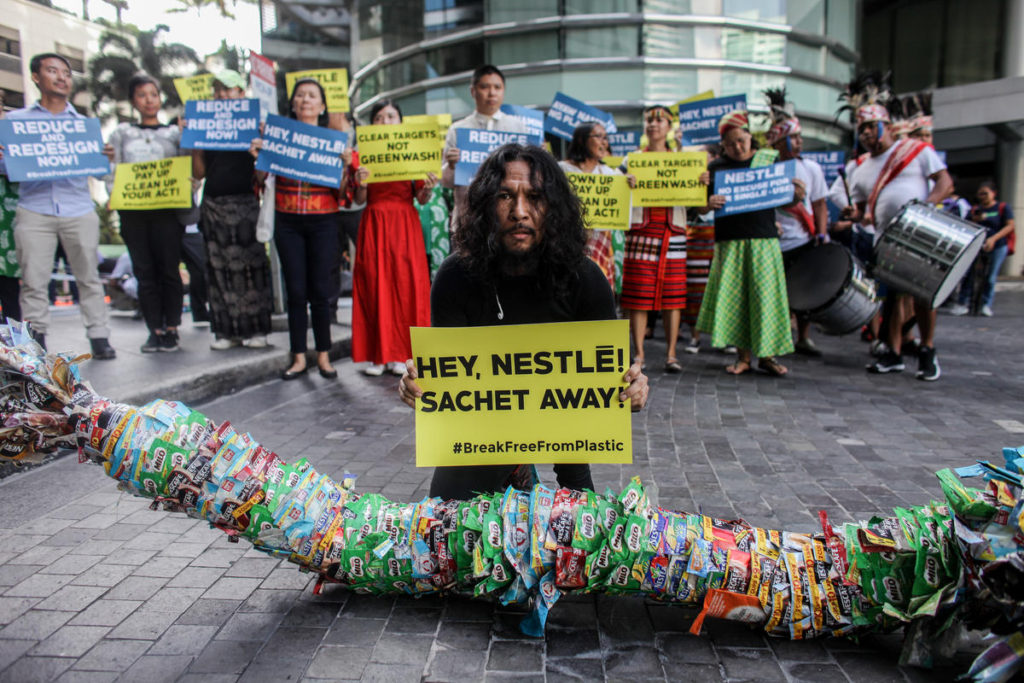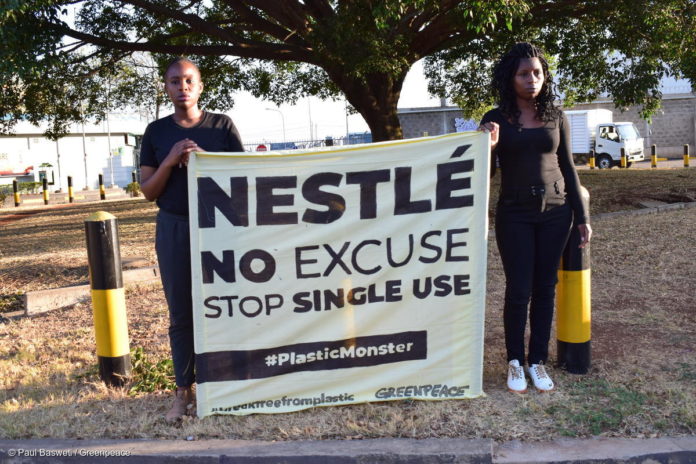|
Getting your Trinity Audio player ready...
|
By Clifford Akumu
Plastic waste pollution in oceans and its effects on human health will only be solved if multinationals end their reliance on single-use plastic – sachets, a lobby group has warned.
Greenpeace Africa urged companies who still depend on single-use plastic for their packaging to take concrete actions to nip in the bud “the complexity of the plastic pollution menace”.
The environmental lobby noted that there were various alternative solutions to single-use plastic among them adoption of new delivery models in packaging based on refill and re-use.
“The more companies delay the single-use plastic issue. We will not surmount the complexity of the plastic pollution problems in our oceans. As environmentalists, we are not going to wait for the ‘plastic monster’ to finish us,” Greenpeace Africa’s Plastic Pollution Campaigner Amos Wemanya said.
He was speaking in Nairobi when the lobby’s activists and volunteers delivered a “plastic monster” covered with Nestlé branded plastic packaging materials at the factory that serves Kenya and other East African Countries.

Activists also held protests at Nestlé offices in the Philippines, Germany and other countries across the globe as part of a global day of action led by Greenpeace and allies from the Break Free From Plastic movement.
Wemanya challenged corporations to stop indiscriminate and unsustainable plastic production noting it was the major cause of clogged drainage systems, a threat to animals and livelihoods across the continent.
Nestlé produces a host of products, ranging from household products to snack items and bottled water.
In its brand audit report released late last year dubbed “A Crisis of Convenience: The corporations behind the plastics pollution menace” and conducted by the #BreakFreeFromPlastic movement across Africa lay bare the pollution menace.
The report found eleven fast-moving consumer goods companies (FMCGs) to be the main corporations behind the plastics pollution pandemic.
Finding itself among the top three polluters in the world, the report further revealed that in the same year Nestlé produced a shocking 1.7 million tonnes of plastic packaging-nearly 300 garbage trucks worth a day-a 13 per cent increase from the previous year.
In 2017 alone, the company produced 1.5 metric tonnes of waste, and the lobby group is worried about the trend.Wenyama said, “If they do not close the single-use plastic production taps and mop up the process, then the plastic problems will still persist”.
But in a quick rejoinder, the company said it was pursuing a series of specific actions aimed at making its packaging recyclable and reusable by 2025.Between 2020 and 2025, the company plans to phase out all plastics that are not recyclable or are hard to recycle.
It also plans to roll out alternative packaging materials across its global product portfolio and build partnerships with cutting-edge packaging specialists.
“Our broader action plan outline our commitment and specific approach to addressing the plastics packaging waste issue,” Nestlé Chief Executive Officer Mark Schneider said in a statement.
Schneider added that recyclability was not a panacea in tackling plastic waste crisis saying collective action is vital.
“We are determined to look at every option to solve this complex challenge and embrace multiple solutions that can have an impact now. You can account on us to be a leader in this space”
But Greenpeace Africa’s Plastics Campaign Lead Renee Olende thinks the company’s actions are “too little, to match their ambitious global targets”.
Plastic pollution, Olende added exacerbate malaria incidences when it rains since they act as breeding ground for mosquitoes.
“We need to break free from plastic pollution to safeguard human health and livelihoods” said Olende.
The lobby took the opportunity to deliver a letter to the management of the company calling on them to reduce production of single-use plastic packaging materials.
Greenpeace has been raising awareness about the plastic production crisis in towns and villages across the globe.














